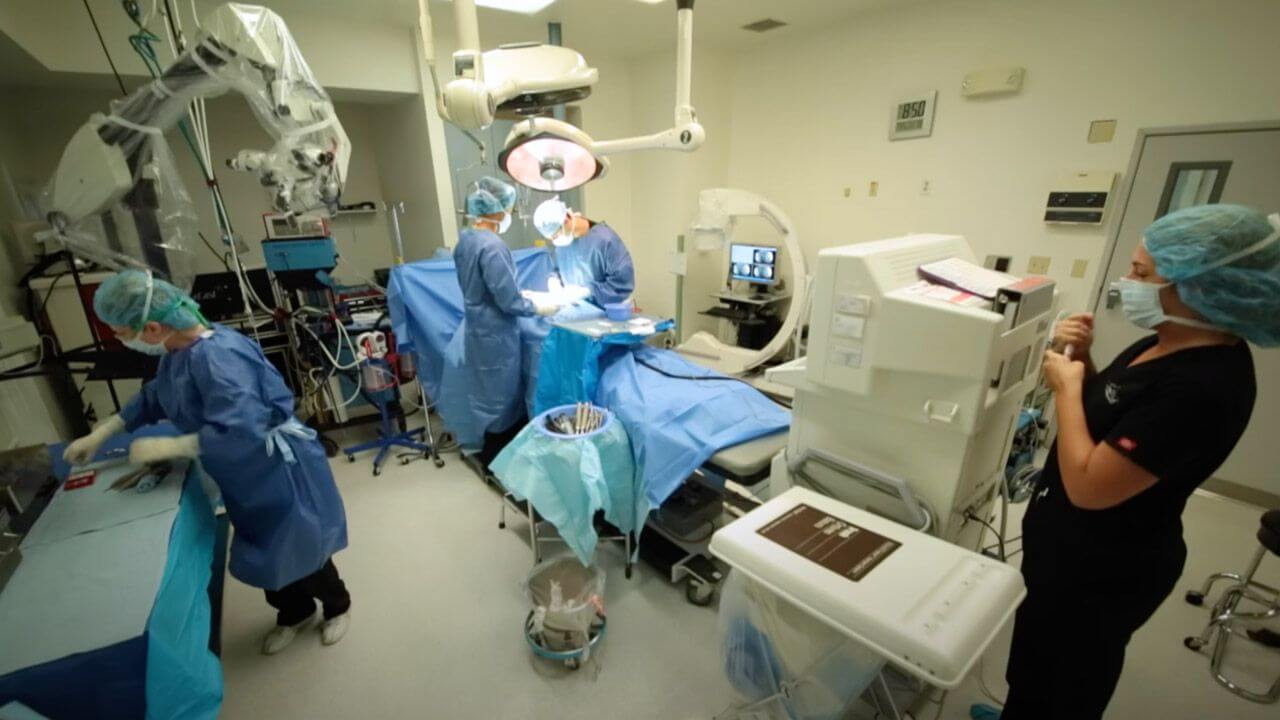Age is often the best indicator of what causes spinal conditions since the spine weakens over time.
With age, people become more likely to develop conditions like spinal myelopathy.
Spinal myelopathy is an internal injury that causes pain in the neck, lower back or limbs due to severe compression. While this condition often results from a separate injury or disease, normal wear and tear can also create symptoms of myelopathy.
As 500,000 people develop spinal cord injuries every year, maintaining proper spine health has become more critical than ever. An accurate spinal myelopathy diagnosis may uncover other conditions causing you pain. You can eliminate your back pain and seek treatment for spinal myelopathy with proper diagnosis and medical care.


Spinal myelopathy is a condition resulting from compressed nerves in the spinal cord. The spinal cord has a system of nerves that connect the head to the entire body, so a constricted section can create widespread discomfort. Depending on where and how this condition occurs in each person’s body, spinal myelopathy can make walking, sitting and fine motor function painful.
Patients experience spinal myelopathy throughout the spinal cord. The three most common types of myelopathy include:
Your spine’s strength depends on each element of its construction. Since the spinal cord is a delicate system, even small amounts of compression can affect your back. Spinal myelopathy is typically a symptom of other spinal conditions that injure your nerves.
Along with the gradual degeneration of your spinal discs, various medical conditions can put you at risk for spinal myelopathy:
Age is often the best indicator of what causes spinal conditions since the spine weakens over time.
Acute spinal myelopathy can result from sudden neck or upper back trauma.
Arthritis and other autoimmune disorders can weaken the vertebrae and cause compression.
Cancerous growths in the spine can press on the spinal cord and weaken the body’s ability to reduce pain.
Spinal stenosis occurs when the passageways in the spine narrow and press on the nerves.
A herniated disc can irritate the spinal cord and create painful myelopathy symptoms.
Spinal myelopathy encompasses many potential symptoms based on where the compressed nerve is. Most patients with spinal myelopathy describe pain or weakness in their legs, arms, feet, lower back or neck.
Even mild cases may put you at risk of a chronic condition, so listen to your body if you have any of the following symptoms:


The ideal treatment plan for you will depend on the severity and cause of your spinal myelopathy. If you’re diagnosed with cervical, thoracic or lumbar myelopathy, you will have surgical and non-surgical pain management options. Many non-invasive therapies and strategies can help you relieve discomfort. For patients with severe root causes, surgical solutions may be best.
The most common forms of non-surgical spinal myelopathy treatment include:

The most common surgical treatment of spinal myelopathy includes:

At a DISC treatment center, we give you detailed attention and care for any spinal condition. As experts in spinal treatment, we provide the pain relief you need to restore your lifestyle. Trust our team of surgeons and specialists to create personalized plans that allow you to begin the healing process and feel the difference.
Choose DISC and receive treatment from the best doctors for spinal myelopathy in Arizona. Reach out to our team online or call 602-944-2900 for more information!
Our spine health blog features up-to-date spine education and expert spine tips from our spine specialists here at DISC.
1635 East Myrtle Avenue Suite 100, Phoenix, AZ 85020, USA
18700 North 64th Drive Suite 105, Glendale, AZ 85308, USA
8630 East Vía de Ventura Suite 210, Scottsdale, AZ 85258, USA
3487 South Mercy Road, Gilbert, AZ 85297, USA
1635 East Myrtle Avenue Suite 400, Phoenix, AZ 85020, USA